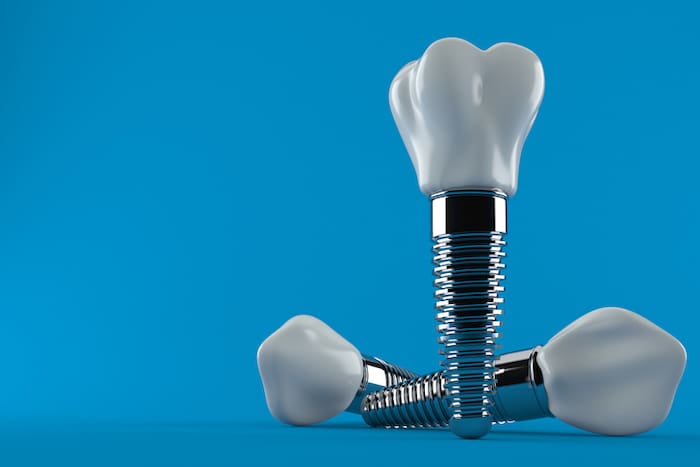Missing teeth is an ongoing problem, particularly for seniors. As you age, you’re more likely to experience missing teeth. While many options exist to replace missing teeth, dental implants are the gold standard. Tyler Family Dental offers dental implants as one of our restorative dentistry services.
What Are Dental Implants?
A dental implant is comprised of three different parts. First, the implant post is the part we place in your jawbone. It’s a titanium post that mimics the natural tooth root. No other tooth replacement option replaces the tooth root. Next, an abutment attaches to the top of the implant post. It joins the implant post with your final restoration.
The final restoration can be many things. We’ll finish it with a custom dental crown if it’s a single implant. Dental implants can also support bridges and dentures. They take the place of natural anchor teeth to support a dental bridge. For a denture, we can place as few as four implants to support an entire arch.
Getting Dental Implants in Tyler, TX
Getting dental implants requires multiple steps. To start, we bring you in for a restorative dentistry consultation. We want to ensure dental implants are the right choice for your needs. During the appointment, we’ll perform a thorough oral exam, discuss your medical and dental history, and use digital diagnostics to determine if you’re a good candidate. Implants require a certain amount of healthy bone tissue to ensure success.
Implants require a surgical component, which is the next step. We place them in your jawbone. They require around 3-6 months to fully fuse with your jawbone before we place your final restoration. Osseointegration is what gives implants the stability they’re known for. We may provide a temporary restoration while you’re healing. The abutment can be attached now or later.
We’ll take impressions to create a custom restoration to complete the implant process. The restoration’s size, shape, and shade are all precisely matched to your smile so that the restoration looks natural. We’ll ensure that you’re happy with the fit of the restoration and that it fits the way it should.
The Benefits of Dental Implants
Dental implants are often called the gold standard of tooth replacement. The biggest benefit is that they replace the tooth root. No other restoration provides this. When you lose the tooth root, the jawbone in the area immediately starts deteriorating. This ages your face, causing the skin and facial muscles to sag. A dental implant prevents the jawbone from deteriorating further and encourages jawbone regeneration.
With other restorations, the jawbone deterioration continues, even though you’ve replaced the main part of the tooth. Your jawbone continues to change, so the fit of your restoration changes, too. You usually need to readjust or replace your restoration multiple times throughout its lifetime. Without adjustment, your restoration won’t work properly.
Replacing the tooth root provides unmatched stability because the restoration is anchored in your jawbone. Unlike other restorations, you don’t have to worry about the restoration slipping or falling out when you eat or speak. You don’t need to remove certain foods from your diet, either. Implants give you back close to full bite force so you can eat things like apples confidently.
Implants don’t require intense upkeep, so you won’t have to worry about adding anything extra to your oral care routine. Simply brush and floss your teeth as you normally would. Continue to come to our office for regular checkups so we can ensure that your restoration is working properly.
Schedule a Consultation
If you’re missing teeth, dental implants can complete your smile again. Schedule an appointment online or call our office.
